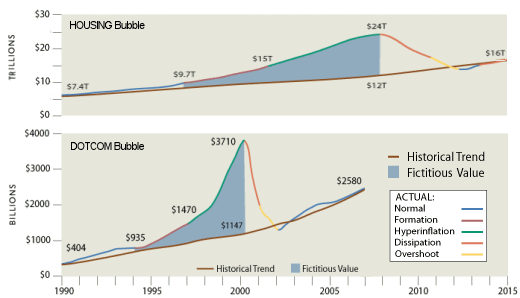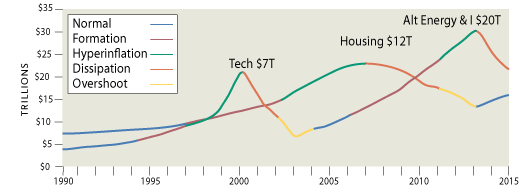Obviously, I am currently obsessed with something I actually know the least possible about – economics. But I think that being as personally uninformed as I was about the last thing I knew absolutely nothing about [Neoconservativism] liked to ruined me. So, I struggle on to try to find a way to have at least a minimal awareness of what these economist people are all talking about. I’m sure that my attempts at conclusions are naive to a fault, but the information along the way has been interesting, at least to me. That said:
In my last post, I presented Paul Krugman‘s plea for quick action to prevent the next crisis. I was roaming around the Internet this afternoon [avoiding football games on T.V.] and I ran across an article in Harper’s from last February about the "Housing Bubble" called The next bubble: Priming the markets for tomorrow’s big crash. It was a curious title and I also thought it would be interesting to read what someone thought before things went south. It was by Eric Janszen, a venture capital person. Here’s a graphic [extensively rebuilt by yours truly] from the article comparing the overlapping DOTCOM bubble and the HOUSING bubble [note the difference in scales – billions and trillions]:

Janszen begins by defining a "bubble" with a dash of sarcasm and iconoclasm that I found refreshing [like an Altoid]:
A financial bubble is a market aberration manufactured by government, finance, and industry, a shared speculative hallucination and then a crash, followed by depression. Bubbles were once very rare—one every hundred years or so was enough to motivate politicians, bearing the post-bubble ire of their newly destitute citizenry, to enact legislation that would prevent subsequent occurrences. After the dust settled from the 1720 crash of the South Sea Bubble, for instance, British Parliament passed the Bubble Act to forbid “raising or pretending to raise a transferable stock.” For a century this law did much to prevent the formation of new speculative swellings. Nowadays we barely pause between such bouts of insanity. The dot-com crash of the early 2000s should have been followed by decades of soul-searching; instead, even before the old bubble had fully deflated, a new mania began to take hold on the foundation of our long-standing American faith that the wide expansion of home ownership can produce social harmony and national economic well-being. Spurred by the actions of the Federal Reserve, financed by exotic credit derivatives and debt securitiztion, an already massive real estate sales-and-marketing program expanded to include the desperate issuance of mortgages to the poor and feckless, compounding their troubles and ours.
The article itself is not, however, all facetious. It has a lot of information about these two "bubbles" – how they came to be and what sustained them. He believes that our current economy is an illusion – a Depression being held off by smoke and mirrors. He thinks we need bubbles to survive, but that each new bubble must pay off the last one – a vicious cycle inevitably heading for a huge crash. With that, he predicts that the next bubble will be Alternative Energy, and makes a really fine argument for his case. By his definition, it must outdo the Housing bubble in scope, and he ventures a prediction about when and how much:

He ends with:
The next bubble must be large enough to recover the losses from the housing bubble collapse. How bad will it be? Some rough calculations: the gross market value of all enterprises needed to develop hydroelectric power, geothermal energy, nuclear energy, wind farms, solar power, and hydrogen-powered fuel-cell technology—and the infrastructure to support it—is somewhere between $2 trillion and $4 trillion; assuming the bubble can get started, the hyperinflated fictitious value could add another $12 trillion. In a hyperinflation, infrastructure upgrades will accelerate, with plenty of opportunity for big government contractors fleeing the declining market in Iraq. Thus, we can expect to see the creation of another $8 trillion in fictitious value, which gives us an estimate of $20 trillion in speculative wealth, money that inevitably will be employed to increase share prices rather than to deliver “energy security.” When the bubble finally bursts, we will be left to mop up after yet another devastated industry. FIRE, meanwhile, will already be engineering its next opportunity. Given the current state of our economy, the only thing worse than a new bubble would be its absence.
I don’t present this article as fact, though I thought it was some interesting thinking. The notion that our economy is creating crisis after crisis because it is fundamentally unsound is an idea that nags at me whenever the topic comes up. It reminds me of patients who presented with what superficially looked like a life crisis, but were in fact living crisis lives – lives that required crises to avoid dealing with fundamental personality flaws. If the economy’s "fundamentals are strong," why do we have to keep manipulating it? How can we continue to be the world’s best customer, when we’re not supplying much of anything in return? If we establish a solid, well-overseen economy as Krugman suggests, will we wake up in a very deep hole? If we let nature take its course and let whatever needs to happen play itself out, will we have another Great Depression? If we continue to manipulate things, are we postponing an even more devastating crash?
But my biggest worry is, "Will our new president [who I personally think is the best possible choice] be able to sort through these questions and do the least wrong thing, even if it is a very unpopular thing. In a way, having an absolutely awful government protected us from having to think about what a really good government ought to do. F.D.R. helped us wind our way through a monsterous time in the last century, aided by a World War. We shouldn’t forget that the people we fought, the Germans, had come under the influence of the most evil ruler ever, because he offered to help them escape a terrible Depression. Economy sits under everything, and Obama may have to make some decisions that take us down a painful road. I don’t question that he’ll do it if that’s what we need. What worries me is whether he [or anyone] will know that it needs to be done. Are bubbles and crises the cause of our economic woes? or is our fundamentally flawed economy causing the bubbles and crises? or are we creating bubbles and crises to avoid seeing that we have a fundamentally flawed economy? Wow!…
Sorry, the comment form is closed at this time.